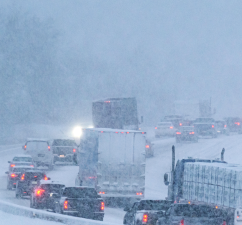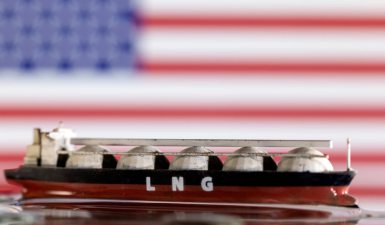
Barely after the scorching summer, European countries are facing a new worry: the impending cold winter. Recently, sanctions against Russia have triggered a severe "gas shortage," sending European natural gas prices soaring. European natural gas futures have surged, reaching a six-month high. Although Germany's natural gas reserves have increased faster than expected, leading to a rare drop in European gas prices, all signs indicate that this is only a temporary blip and has not fundamentally changed the situation.
According to the Natural Gas Intelligence Network, Uniper, Germany's largest importer of Russian natural gas, has applied to the government for a €4 billion credit line to mitigate the impact of energy market volatility. Meanwhile, the German government acknowledged in its latest report that natural gas shortages are likely to worsen. According to Bloomberg, even if Germany's gas storage capacity reaches capacity as planned, it would be difficult for its reserves to sustain it for more than three months if Russia completely halts supply.

Germany's Energy Dilemma
Germany's predicament, to some extent, reflects the broader situation in Europe. As Europe's largest economy and natural gas consumer, the challenges it faces are representative. Since the outbreak of the Russia-Ukraine conflict, natural gas prices in Europe have soared several times. However, with no immediate alternative supply sources, the EU was forced to work with the US to painstakingly reach a natural gas consumption reduction agreement, which began implementation on August 1st.
Joint Gas Reduction Agreement and the US Role
Bloomberg News revealed that the "gas reduction" agreement requires EU countries to take "voluntary measures" to reduce natural gas demand by 15% this winter. If unexpected situations such as supply shortages arise, the EU will be forced to implement stricter mandatory measures to limit demand. US President Biden's promise played a key role in the EU's move. During his March visit to Europe, Biden announced that an additional 15 billion cubic meters of US-produced liquefied natural gas would be shipped to the EU this year in exchange for the EU's follow-up US energy embargo on Russia.
US Energy Market Changes and Strategies
US Natural Gas Export Growth
With this "promise," the US not only deepened sanctions against Europe but also firmly seized control of Europe's energy security. According to the latest data from the International Gas Information Association, the United States, thanks to increased LNG supplies to Europe during the Russia-Ukraine conflict, became the world's leading liquefied natural gas (LNG) exporter in the first half of this year, with Europe accounting for 68% of this total.
Europe's Energy Dependence and US Motives

Due to multiple factors, including extraction and transportation costs, US LNG prices have remained relatively high compared to Russian natural gas, which is closer to Europe and easily accessible via pipeline. The recent depreciation of the euro to parity with the US dollar has made the additional costs borne by Europe as an LNG importer even more significant. In fact, the US government's strategy has enabled LNG producers and exporters to exploit the EU's energy difficulties and reap lucrative profits. Economic Impact and Future Options for Europe
- Economic Difficulties and Rising Inflation
-Business Insider reported that many European countries are struggling to meet winter energy demand. Even Germany, which had planned to phase out coal-fired power generation by 2038, has restarted some of its idled coal-fired power plants, a significant blow to the EU's commitment to combating climate change. Meanwhile, European stock markets fell, and rising energy prices further exacerbated an already dire economic situation. According to the latest data from Eurostat, eurozone inflation soared to 9.1% in August, a record high, with soaring energy prices being the primary driver.
- Discussions and Differences on Sanctions Against Russia
-Recently, Hungarian Prime Minister Viktor Orbán again criticized the EU's sanctions policy, reiterating that US and Western sanctions against Russia are failing, not only failing to achieve their intended effects but also severely impacting the EU's own economy.
According to a recent speech by Hungarian Foreign Minister Peter Szijjarto, Hungary is "not alone" in opposing sanctions against Russia.
Even Lithuania, the EU member state known for its "strongest adherence to the US and anti-Russia stance," is deeply troubled by the growing divisions within the EU over sanctions against Russia.
In a recent interview, Lithuanian Foreign Minister Landsbergis admitted that the EU's interest in increasing sanctions against Russia has gradually waned. Meanwhile, German Bundestag member Alice Weidel also expressed her concerns in an exclusive interview with CCTV reporters. She pointed out that as a country highly dependent on energy imports, Germany's relentless pursuit of sanctions against Russia would undoubtedly harm its own interests. Weidel emphasized, "We should not sacrifice our own interests to follow the United States."
Challenges and Risks of EU Energy Policy
-In an interview, Alice Weidel noted that Europe and Ukraine are geographically adjacent, while the United States is far across the Atlantic, presenting a starkly different geopolitical environment. She believes that European countries' assumption of risks and acting as a "shield" for the United States is premature.
These remarks sharply reveal Europe's dilemma and helplessness regarding energy issues. Foreign Policy magazine noted that the US push for an energy embargo against Russia and its attempts to obstruct EU-Russia cooperation on the Nord Stream 2 natural gas pipeline project are motivated by its own selfish desire to increase energy exports to Europe. However, the reality is that US liquefied natural gas cannot fill the significant gap in Russian natural gas supply; its contribution is minimal. If Europe cannot find a stable alternative energy supply, repeated energy crises will impose severe environmental and political burdens on Europe.
